Expert’s Rating
Pros
- Clean, appealing design
- Punchy AMOLED display
- Impressive software update promise
Cons
- Sluggish performance
- Battery life worse than A15 5G
- Poor secondary cameras
Our Verdict
The Samsung Galaxy A16 5G is another sound budget phone that won’t let you down, though its slick design and display are undermined by sluggish performance and battery life that seems to have gone backwards.
Price When Reviewed
This value will show the geolocated pricing text for product undefined
Best Pricing Today
Samsung’s flagship phones tend to get all the glitzy launch events, leaving the likes of the Galaxy A16 5G to slip out with little to no fanfare. That’s a shame, because Samsung’s latest sub-£200/$200 smartphone is accessible to a much wider range of users.
Much like the Galaxy A15 5G it replaces, this is a budget phone with a clean design, a large 90Hz display, exemplary stamina, and a camera that will grab you decent snaps in suitably favourable conditions.
With little changes of consequence from the previous model, however, does it still offer good value for money?
Design & Build
- Blue Black, Light Green, or Light Grey colourways
- Familiar flat-edged plastic body
- No IP rating
One thing that I’ve come to appreciate about Samsung’s entire smartphone range in recent years is its unified design language. Aside from the very top dogs (your Galaxy S24 Ultra and your Galaxy Z Fold 6), all of the manufacturer’s phones kind of look alike.
And so when I sit the £199 Galaxy A16 5G alongside the £649 Galaxy S24 FE, as I have right now, there’s really not much between them. Sure, the cheaper phone’s power/fingerprint button and volume keys bulge out slightly from the flattened rim, but that’s an embellishment I quite like.
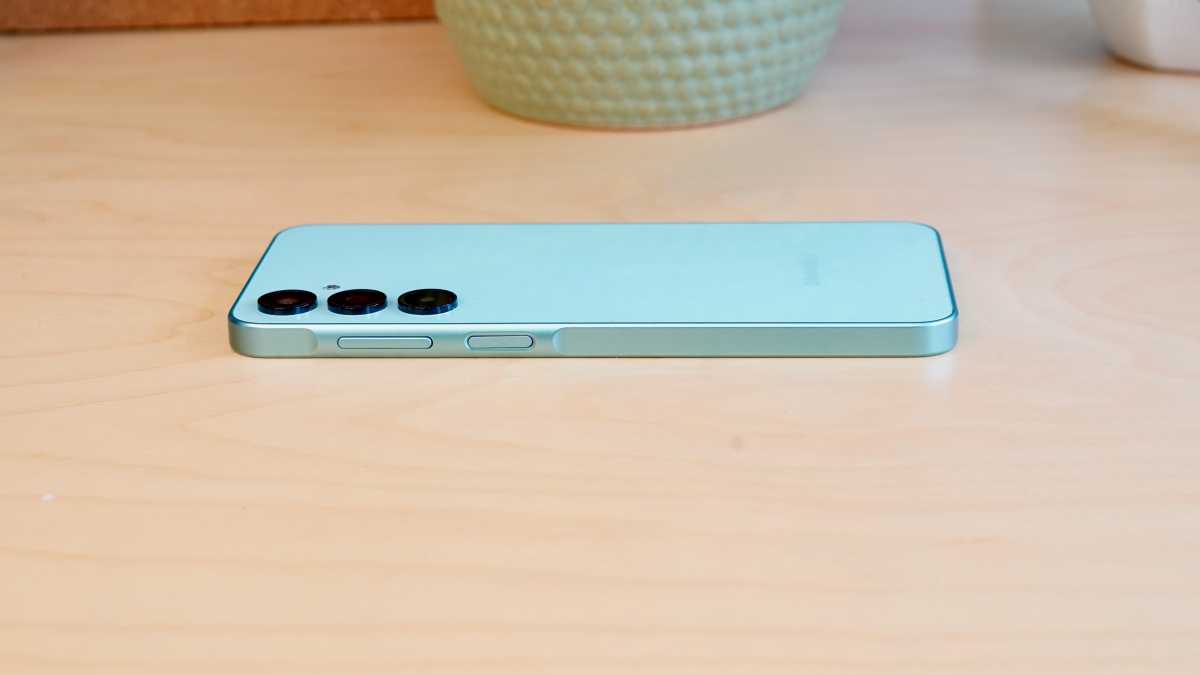
Jon Mundy / Foundry
The difference lies in such minor details, with the cheaper A16 5G having a larger chin bezel, and its plastic rim having a softer edge than the S24 FE’s sharp metallic alternative.
But the point stands that buying a Samsung phone released 2024 in ensures you a certain look – minimalist camera module strip and all – not to mention a certain level of fit and finish.
The Galaxy A16 5G might be cheap, but it doesn’t feel plasticky, even though it’s made of plastic. At 164.4 x 77.9 x 7.9mm it’s quite large but relatively thin (about 0.5mm thinner than the A15 5G), and at 200g there’s genuine heft to the phone. My model comes in a soft Light Green hue, but you can also specify it in sober Blue Black or Light Grey.
The Galaxy A16 5G might be cheap, but it doesn’t feel plasticky, even though it’s made of plastic
It’s a shame there’s still no IP rating here, but that’s not an expected feature at this price. You’ll need to spend £70 more on a Motorola Moto G75 5G if that’s a priority for you.
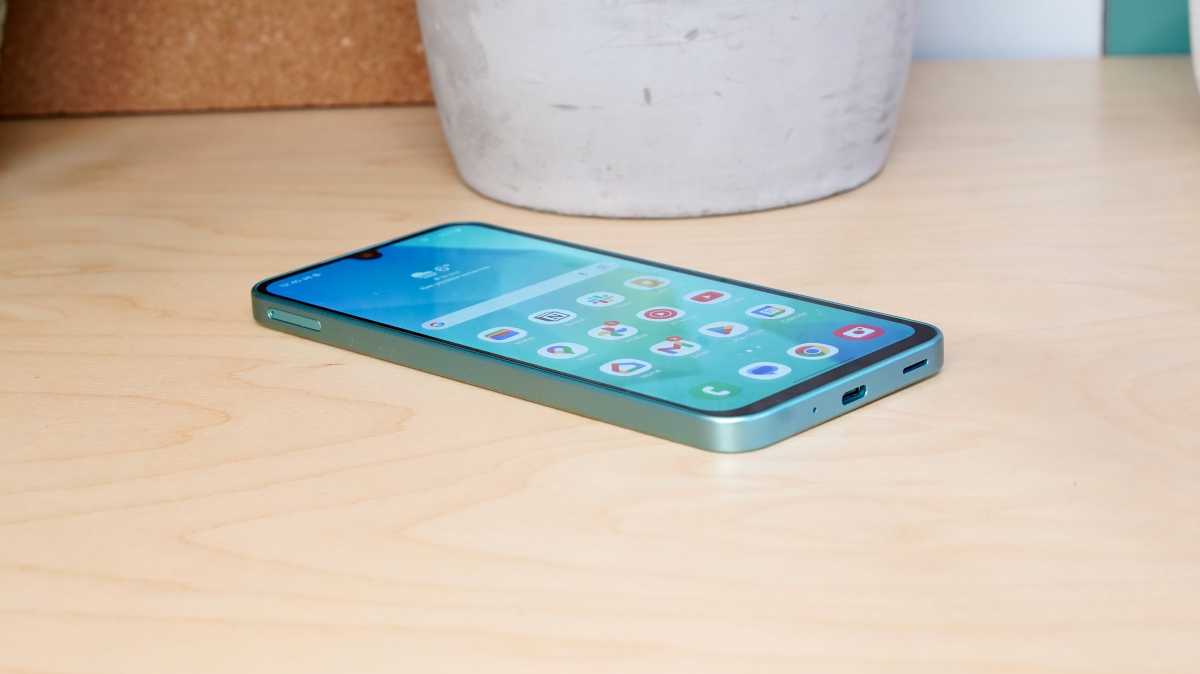
Jon Mundy / Foundry
Screen & Speakers
- Larger 6.7-inch, 90Hz AMOLED display
- Teardrop selfie notch
- Dual stereo speakers
Samsung has gone with a slightly larger 6.7-inch display this time around, but with the same vibrant Super AMOLED colours and a reasonably fluid 90Hz refresh rate.
Some might quibble about that 90Hz figure, with 120Hz fast becoming the industry standard. But with phones in this category, where performance is limited, it makes sense to scale things back a little. It’s still 50% more responsive than the iPhone 16 and 16 Plus displays.
Brightness tops out at 800 nits in high brightness mode (HBM), which is exactly the same as the Galaxy A15 5G, so no change there. It’s perfectly decent when viewed indoors and even outdoors on these grey winter days, but I suspect it’ll feel a little dim come summer. It should still be usable, though.
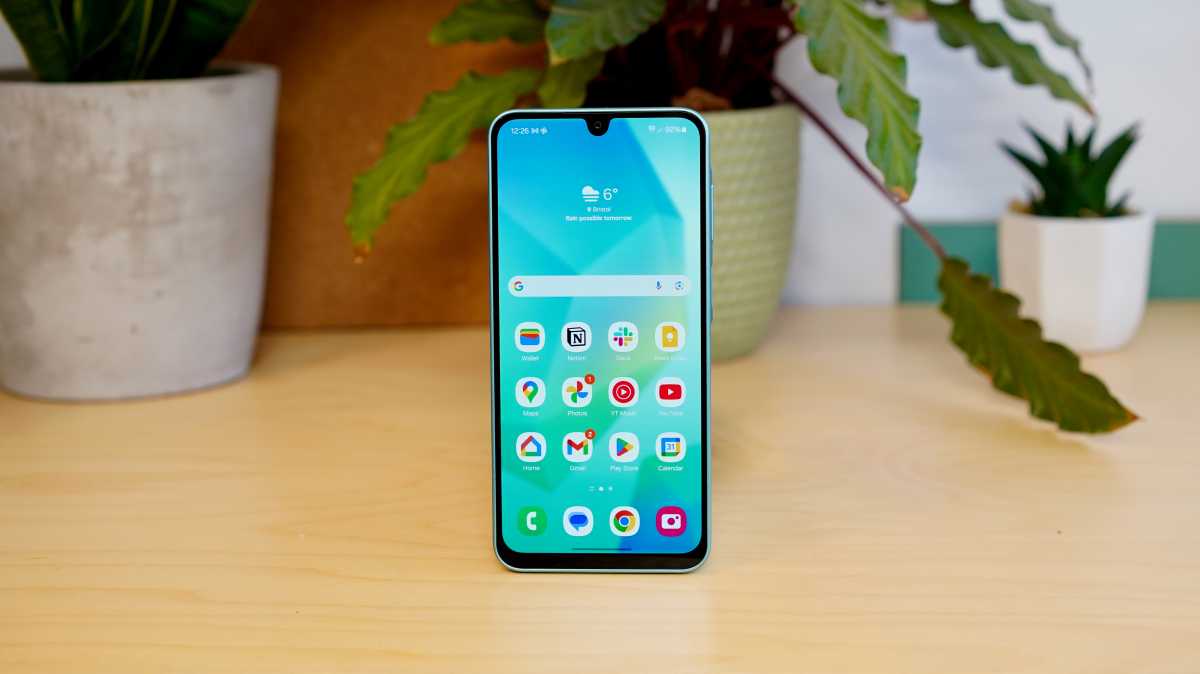
Jon Mundy / Foundry
As I alluded to in the previous section, the Galaxy A16 5G has some chunky screen bezels, particularly with its elongated chin. You’ll also have to make do with another teardrop notch, which feels a little dated.
All in all, it’s a decent panel for watching media back on, though it doesn’t give across that ‘painted on the surface’ sensation of more expensive Samsung phones.
It’s a decent panel for watching media back on, though it doesn’t give across that ‘painted on the surface’ sensation of more expensive Samsung phones
You don’t get stereo sound to accompany that media content either, which is a shame. The Galaxy A16 5G relies on a single speaker on the bottom edge of the phone which, to its credit, gets nice and loud.
It gets quite piercing and tinny at higher volumes, with virtually nothing in the way of low-end balance, but it’s clear enough at more sociable volumes.
Specs & Performance
- Exynos 1330 chipset
- 4GB RAM and 128GB storage
- MicroSDXC slot
Samsung hasn’t been advertising the Galaxy A16 5G’s chipset, which perhaps reflects the fact that it uses two different chips depending on the region.
The global model that I’m using here packs Samsung’s own entry-level Exynos 1330 chip, along with a very modest 4GB of RAM. The combination produces modest performance, which continues to be the weak point of Samsung’s sub-£200 smartphone line.
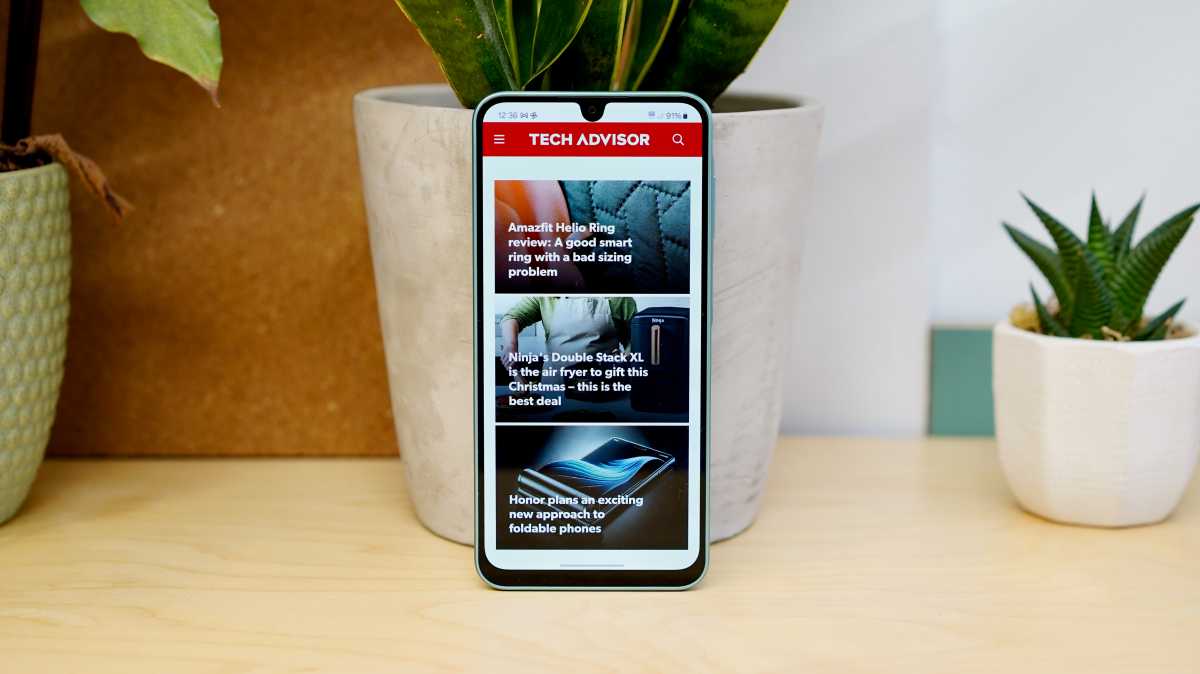
Jon Mundy / Foundry
Once the phone was warmed up and didn’t have to deal with too many background processes, general navigation proved fluid enough. However, stutters and micro-pauses aren’t exactly rarities when using the phone when firing up and flitting between multiple apps.
You have to suspect that these glitches would have been significantly smoothed out if Samsung had only squeezed 8GB of RAM in, which seems to be Android’s comfortable spot.
Stutters and micro-pauses aren’t exactly rarities when using the phone when firing up and flitting between multiple apps
If you’ve only ever used cheap phones, it’s quite possible you won’t notice this halting performance. All I can say, as someone who uses a wide range of devices, is that I did.
Needless to say, any high-end gaming ambitions are probably best left at the door. It’ll run Genshin Impact on the lowest settings, but you’ll need to be very patient with it.
Samsung Galaxy A16 5G benchmarks
Both CPU and GPU benchmark tests suggest a minimal upgrade on the Galaxy A15 5G at best. The £200 Moto G55 with its MediaTek Dimensity 7025 chip soundly beats it.
Camera
- 50Mp main rear camera
- 5Mp ultrawide
- 2Mp macro lens
- 13Mp selfie camera
As far as I can tell, Samsung has used exactly the same camera setup as the Galaxy A15 5G on Galaxy A16 5G. There’s the same 50MP main camera with f/1.8 aperture, same 5Mp f/2.2 ultra-wide, and the same pointless 2Mp macro lens.
You also get the same 13Mp front camera in that dated teardrop notch.
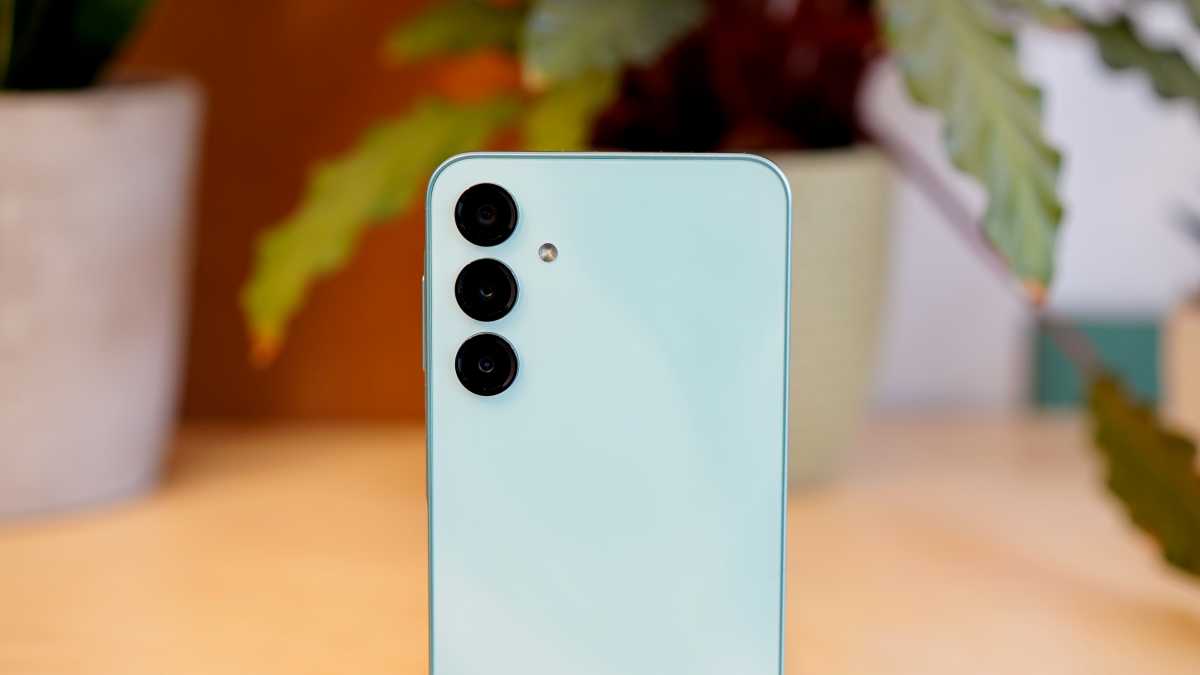
Jon Mundy / Foundry
This means that you’ll get pretty so-so results, even with Samsung’s solid image processing chops. In good lighting, with the main 50Mp camera, the Galaxy A16 5G is capable of capturing decent shots with adequate exposure and dynamic range.
The 5Mp ultra-wide brings with it a huge drop-off in quality, with bags of noise and a pronounced loss of detail and colour tone
Samsung’s punchy colour science (which is actually a lot more natural than it used to be) ensures that you don’t get any of the flatness or muddiness that cheap phone cameras used to produce.
Step away from ideal conditions, however, and the quality will fall off fast. The 5Mp ultra-wide brings with it a huge drop-off in quality, with bags of noise and a pronounced loss of detail and colour tone.
Zoomed shots crop in on that main sensor, which produces just about acceptable (if slightly grainy) results at 2x, and total fuzz fests at 4x and 10x.
Allow the light to drop, and even the main camera won’t bail you out. In low-lit restaurants and pubs that sharpness started to disintegrate, while Night mode shots lack any sort of clarity, with no OIS to enable properly extended shutter times.
Samsung’s 13Mp front camera is a pretty good performer for the money, producing reasonably detailed selfies in good lighting. I particularly liked the option of a close-up view or a wider view.
Battery Life & Charging
- 5000mAh battery
- 25W wired charging
- No charger in the box
Samsung has stuck with the standard 5000mAh battery in the Galaxy A16 5G, and it produces predictably solid battery life. It’s no longer massively noteworthy when a phone lasts two days of light usage, but that’s what the A16 5G provides.
Elsewhere, however, there are a couple of alarm bells ringing. Running the standard PCMark Work 3.0 battery test, which mimics a sustained daily workload, yielded a score of just 10 hours and 24 minutes.
While not terrible, this score falls about 4 hours 30 minutes short of the Galaxy A15 5G, and about 3 hours short of the Moto G55. This is far from rock bottom for a modern affordable phone – the Redmi Note 13 5G scored a good 35 minutes lower – but it’s also way short of the top.
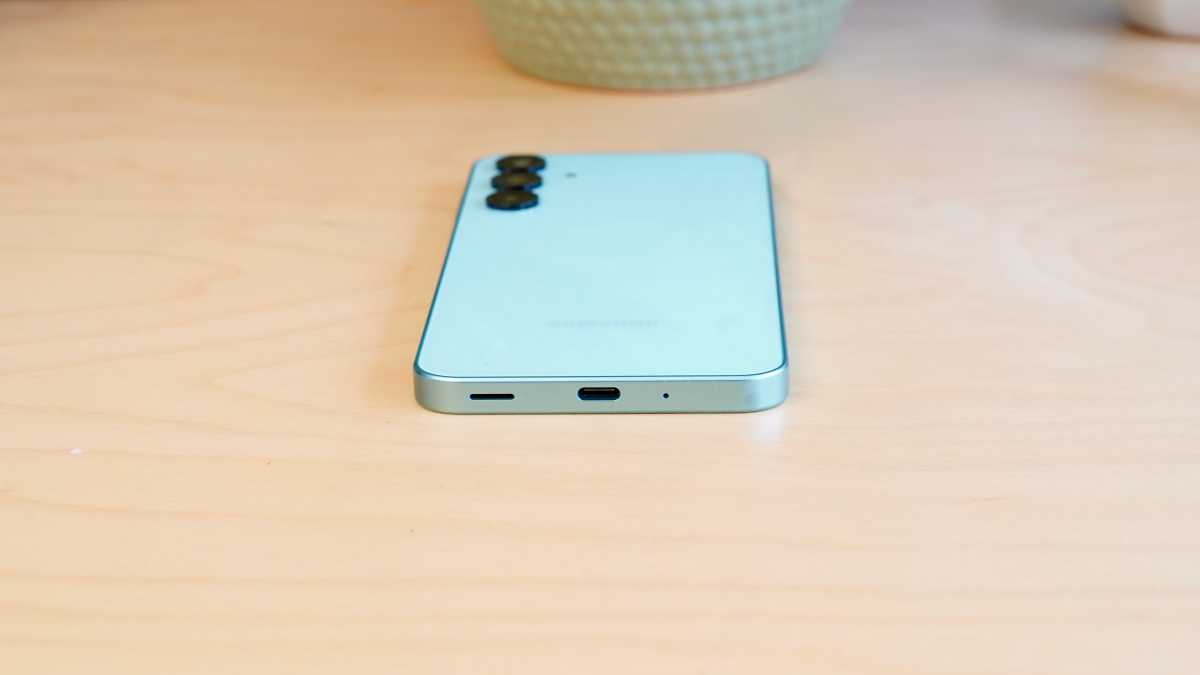
Jon Mundy / Foundry
Samsung doesn’t offer a charger in the box, which can be more problematic in an affordable phone where this might just be the first-ever smartphone for many people. When you do lay your hands on a USB-C charger, it’ll support the same bog standard 25W charging as before.
It’s no longer massively noteworthy when a phone lasts two days of light usage, but that’s what the A16 5G provides
In my experience, using a 65W Samsung charger, the Galaxy A16 5G went from empty to 26% in 15 minutes, and up to 51% in 30 minutes. A full charge takes around 1 hour 25 minutes, which is far from rapid.
There’s no wireless charging, which is no surprise in the sub-£200 category. However, it’s worth offering another shout-out to the Moto G75 5G, which supplies wireless charging for just a little more money (£270).
Software
- Android 14
- One UI 6
- Six years of updates
- None of Samsung’s AI enhancements
The Galaxy A16 5G runs on Android 14 out of the box with Samsung’s One UI 6.1 layered on top. That’s not the latest version of Google’s operating system, but I’m not worried about that.
Samsung has supplied an extensive six-year update promise running through to October 2030. That’s an excellent level of assurance for a phone of this price, and the excellent software support is as one of the Galaxy A16 5G’s standout features.
As for One UI 6.1, it’ll be familiar to anyone who’s used a Samsung phone or tablet over the past several years. Like Samsung’s hardware design, its software looks and handles broadly the same right across the range, with one notable exception that we’ll get to in a minute.
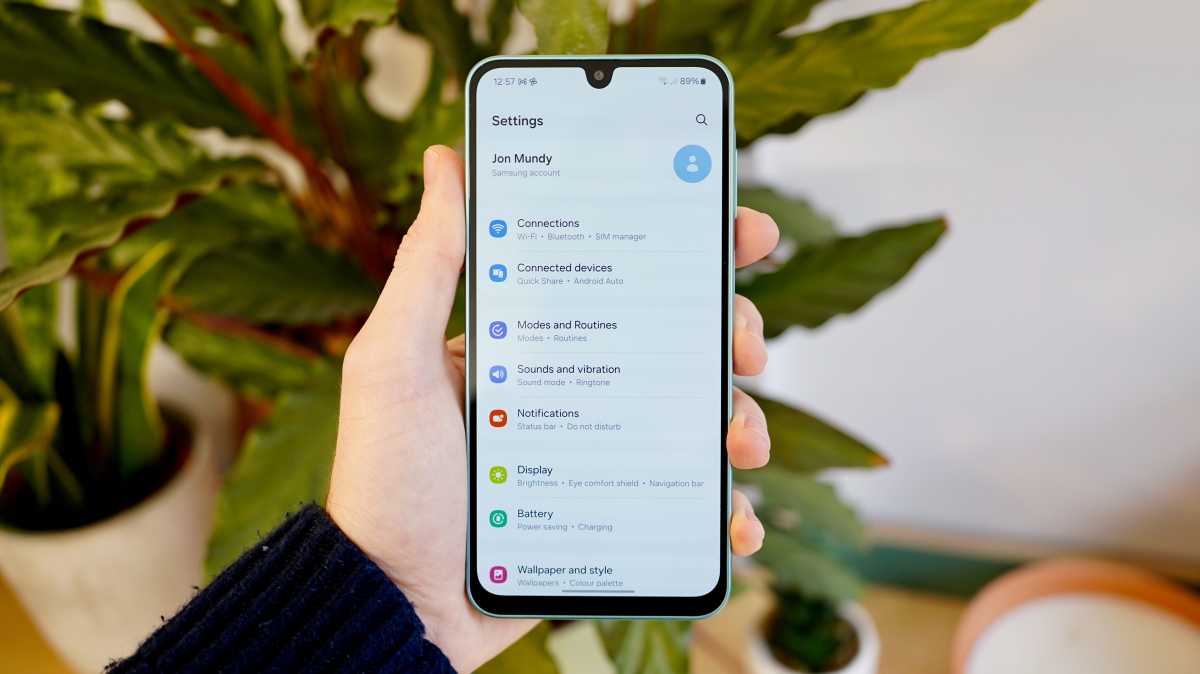
Jon Mundy / Foundry
I’ll confess at this point that One UI has never been my favourite Android skin. It’s a little too busy and Samsung seems too determined to wrestle your interaction away from the solid Google core at every turn.
Whether it’s having to manually install and switch over to Google Wallet, figuring out the opaque method to change the default calendar app, or having to dive into the Settings menu to switch over to gesture control, it all feels like a little more hard work to get everything how I personally like things.
The excellent software support is as one of the Galaxy A16 5G’s standout features
Once you do, One UI is a crisp and immensely customisable UI. It can slow down a little, but that seems to have more to do with the Galaxy A16 5G’s performance limitations than any UI issues.
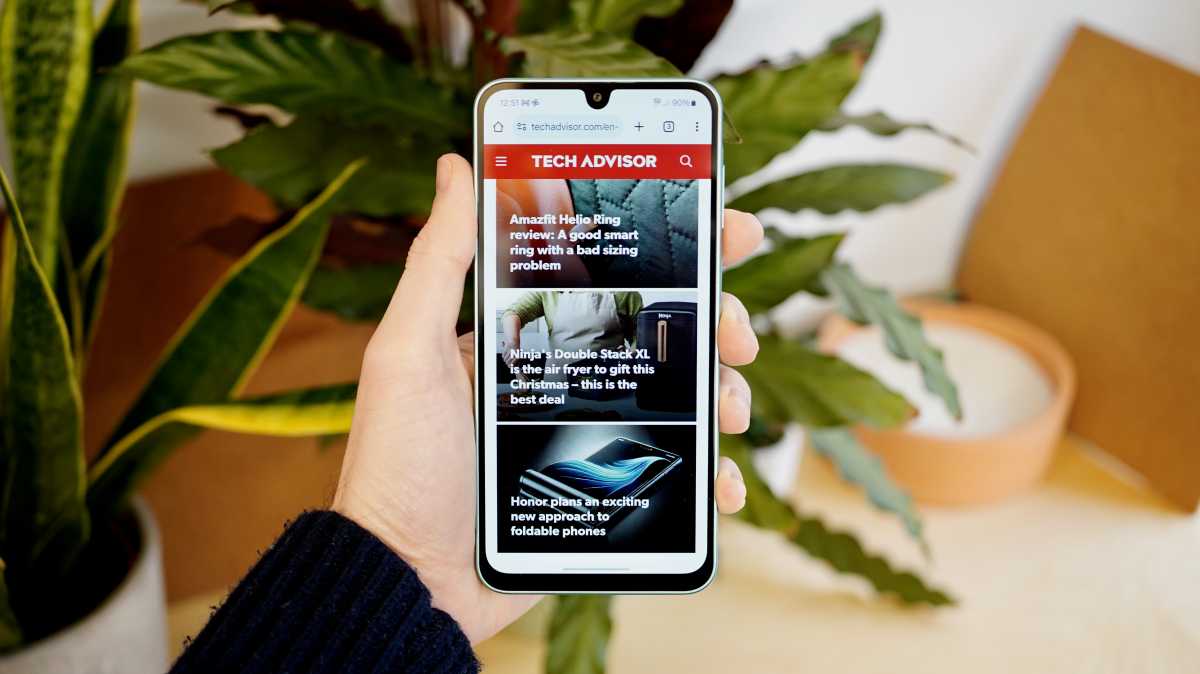
Jon Mundy / Foundry
It’s far from the worst offender when it comes to bloatware too. TikTok and Pinterest might be erroneously listed as ‘essential apps’ at set-up, while Spotify and Netflix are pre-installed without mention, but that’s it for third-party apps.
The one glaring thing missing from One UI 6.1 on the Galaxy A16 5G compared to Samsung’s more expensive phones is AI. There’s no sign of Galaxy AI, Samsung’s suite of AI-assisted tools that help you to write better messages, translate calls, summarise notes and the like.
You don’t get any of Google’s AI tools either, with no sign of the powerful Circle to Search tool. You’ll need to spend more if Samsung’s splurge of AI features takes your fancy.
Price & Availability
The Samsung Galaxy A16 5G is available now at a price of £199, which is the same launch price as the Galaxy A15 5G before it. You can buy it directly from Samsung, or from established third-party retailers like Amazon, Very and Currys.
There’s only one model in the UK, which comes with 4GB of RAM and 128GB of internal storage. Other regions have access to a better model with 6GB or 8GB of RAM and 256GB of storage.
The phone isn’t available on contract, so you’ll have to buy one outright and pair it with a SIM-only deal. See the best options below:
There’s also a cheaper non-5G model that gives you a similar package, but with a Mediatek Helio G99 processor as well as the obvious 4G connectivity.
The Galaxy A16 5G has also launched in the US for $199 still with 6 years of OS updates. You can buy it on 9 Janaury 2025 from Samsung and retailers.
When it comes to alternatives, the Galaxy A16 5G goes directly up against budget phones such as the the Motorola Moto G55 at £199 and CMF Phone 1 at £209. Our recommendation would be to look for discounts on phones from the likes of Poco, Redmi, Honor and indeed Samsung that typically sell for closer to £300.
Discounts run frequently at this end of the market, and you’ll find that you can get a lot more for your money, particularly in terms of performance and camera quality.
Should you buy the Samsung Galaxy A16 5G?
The Samsung Galaxy A16 5G is another adequate cheap phone from Samsung, offering an appealing design and a punchy AMOLED display for just under £200/$199.
Not much progress has been made on the Galaxy A15 5G, with similarly sluggish performance and the same middling camera set-up. One big improvement is Samsung’s vastly improved software update promise.
Conversely, battery life doesn’t appear to be quite as strong as before, particularly when it comes to sustained usage.
All in all, the Galaxy A16 5G is a perfectly acceptable cheap phone. However, you’ll find much better value by either spending a little more money or looking around for a discount and spending more wisely.
Specs
- Android 14 with six years of updates
- 6.7-inch, FHD+, OLED, 90Hz, flat display
- Side-mounted fingerprint sensor
- Exynos 1330 or MediaTek Dimensity 6300 (varies by region)
- 4GB/8GB RAM
- 128GB/256GB storage
- 50Mp, f/1.8 main camera
- 5Mp, f/2.2 ultra-wide camera
- 2Mp, f/2.4 macro camera
- 13Mp, f/2.0 front-facing camera
- Dual stereo speakers
- Wi-Fi 802.11 a/b/g/n/ac
- Bluetooth 5.3
- 5000mAh battery
- 25W charging
- 164.4 x 77.9 x 7.9 mm
- 200g




